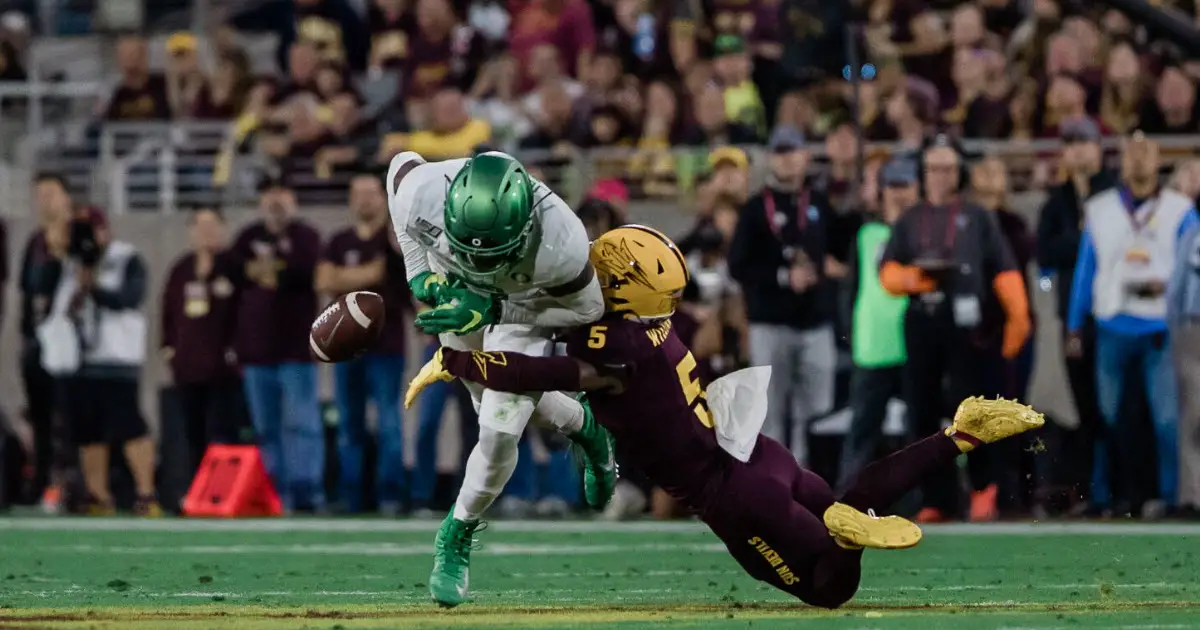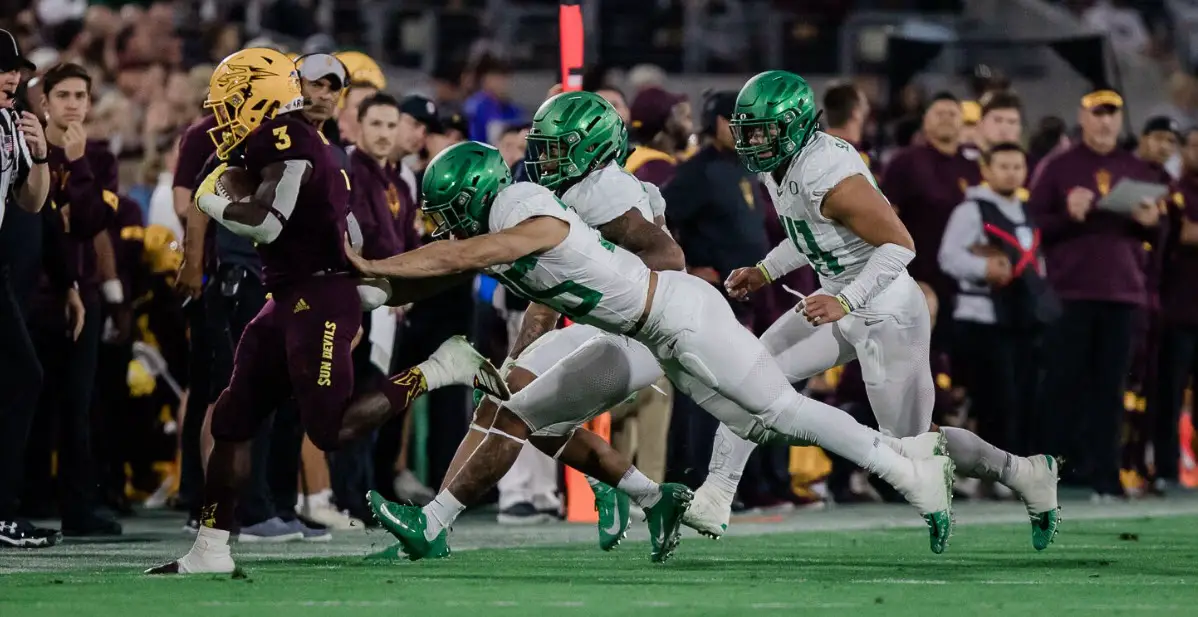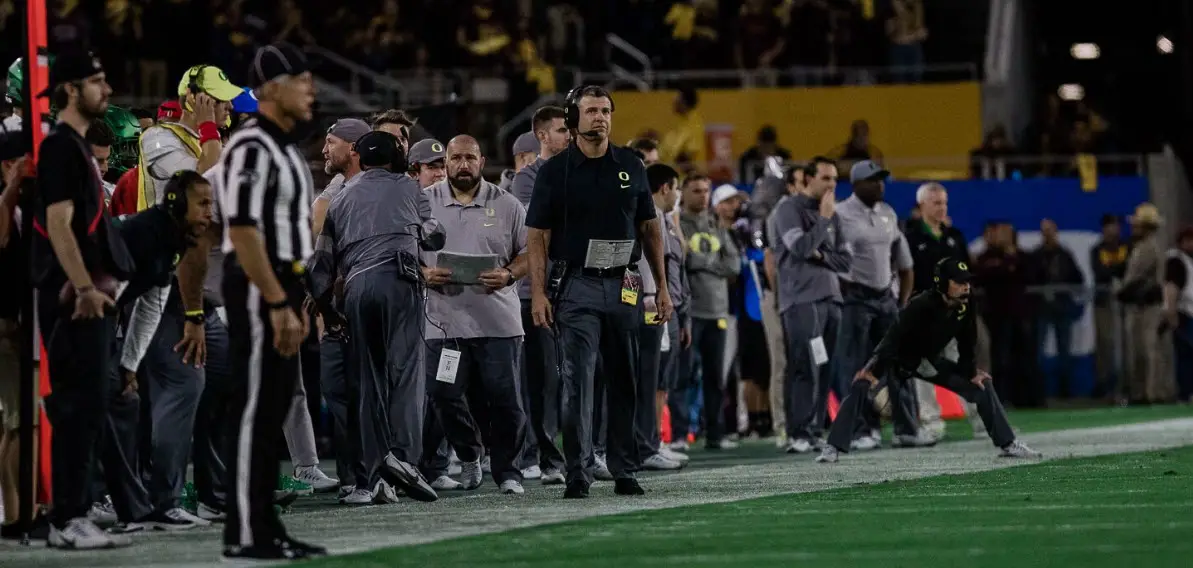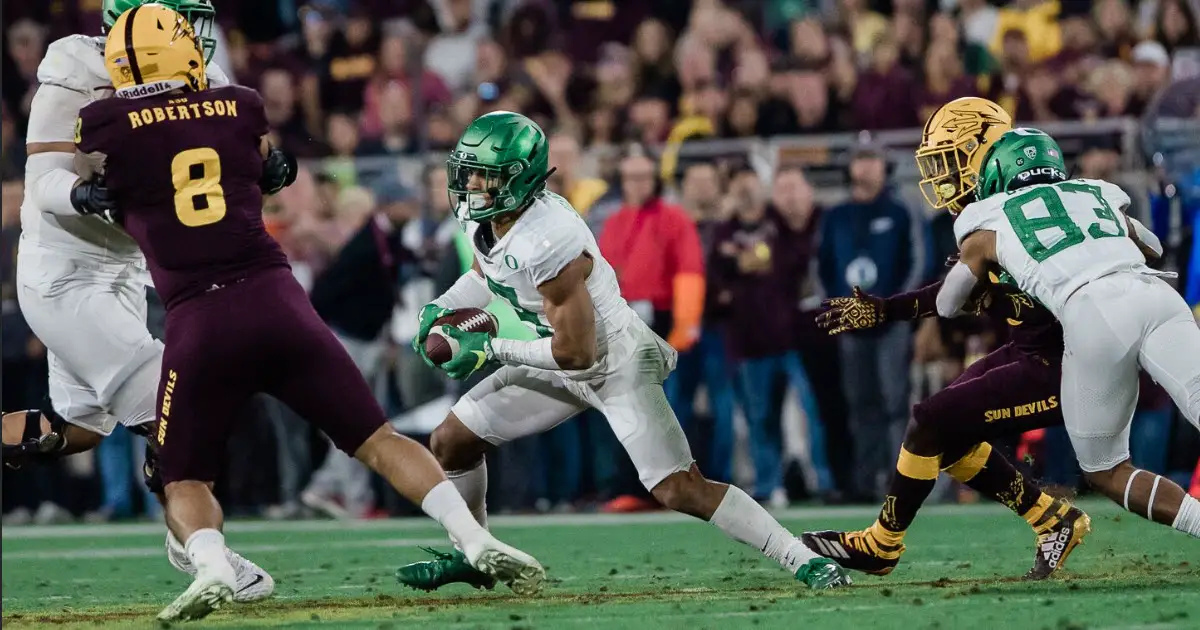In the three games leading up to the showdown with Arizona State, Oregon committed 26 penalties for 320 yards. Against the Sun Devils, the Ducks committed only three penalties for 21 yards.
Typically, that sort of improvement would be associated with a win. Not giving the opposing team extra yards and opportunities is usually a sign that a team is becoming more disciplined. But on Saturday night, the lack of penalties was indicative of only one thing: a lack of energy.
During the three games in which Oregon averaged over 100 penalty yards, the Ducks were undefeated and played with fire on both sides of the ball. Late hits were the result of players not quitting on plays, pass interference penalties were due to the refusal of defensive backs to give up big plays, and unsportsmanlike conduct penalties followed touchdowns that broke games wide open.
The only unnecessary roughness penalty assessed to Oregon against Arizona State was due to frustration by the defense — a unit that was routinely left out to dry by the offense.
Offensive Woes
Oregon’s offense had about fifteen minutes where they showed some life. Early in the first quarter, the Ducks moved the ball effectively, scoring a touchdown after a ferocious second drive during which they ran the ball frequently and effectively.

Juwan Johnson was mostly a non-factor against ASU.
After a late first-quarter drive stalled inside the ASU 10-yard line, the Ducks failed to move the ball more than 40 yards on any drive until midway through the third quarter. The issue with the offense was obvious: Justin Herbert was off from the first drive of the game. He missed throws he has made dozens of times and failed to see open receivers all game long. He threw two interceptions, and had two more dropped, and he routinely killed Oregon drives by making poor decisions.
The running game found lanes all night, gashing the Sun Devils repeatedly. CJ Verdell opened the second half with four carries for 26 yards before Oregon started throwing the ball. Herbert went 1-4 passing on the drive, ending with three straight incompletions and killing any momentum the running game might have created.
Maybe the most striking issue for the Oregon offense was their low time of possession. They had the ball for only 23:07 compared to Arizona State’s 36:53. Considering the length of a typical Oregon scoring drive this season, the lack of possession time indicated a shaky and ineffective offense.
The Ducks’ offense did come to life in the fourth quarter. Herbert started completing passes, and Johnny Johnson III looked like he was trying to win the game single-handedly. But playing good football for the last eight minutes of the game did not excuse an abysmal performance up until then, and the effort came up just short.
Defeated Defense
The lifeblood of the 2019 Oregon football team has been their defense. Ranking in the top 20 nationally in nearly every major defensive category coming in to the game, the unit was the biggest reason the Ducks were 9-1.

Oregon could not contain Eno Benjamin consistently.
Saturday night, they found themselves out of position so often that they were lucky to have given up only 31 points.
Oregon gave up passing touchdowns of 57, 26 and 81 yards. The two longer touchdowns were the two biggest plays the defense had allowed all season. They also gave up passes of 46 yards and 25 yards. Jayden Daniels shredded the veteran secondary from start to finish, and it resulted in a tough-to-swallow loss.
The pass rush did not help mitigate the Sun Devils’ explosive air attack, as they netted only two sacks, both in the fourth quarter. The lack of containment by the front seven resulted in several QB runs and throws to Eno Benjamin out of the backfield, which prolonged drives and kept the Ducks’ offense off the field. The Ducks’ defense was on the field for over 13 minutes longer than the ASU defense, but that does not excuse their poor coverage and the lack of impact by the defensive line.
Dead Sideline
The Ducks had won nine straight games before they lost to Arizona State. When a team reels off nine straight wins, they tend to develop an identity. The Oregon sideline is typically the most raucous place in every stadium. The players jump up and down, cheer for their teammates and get in each other’s faces when players aren’t turning in their best efforts.

The Oregon sideline lacked energy all game long.
Against the Sun Devils, Oregon had no sideline energy. Players weren’t speaking to one another, let alone pumping each other up. After his first interception, Herbert sat alone on the sideline. No teammates came over to try and motivate their quarterback. He threw another interception on his next attempt. The sideline failed to bring energy to the game in Arizona, and the team suffered the consequences.
If they fail to bring the energy two weeks in a row, Oregon is going to have a difficult time dealing with a dangerous, opportunistic and desperate Oregon State team in Eugene next week. Hopefully, it doesn’t come to that.
Ryan Robertson
Yuma, ArizonaTop Photo Credit: Irina Filenko
 Andrew Mueller, the FishDuck.com Volunteer Editor for this article, works in digital marketing in Chicago, Illinois.
Andrew Mueller, the FishDuck.com Volunteer Editor for this article, works in digital marketing in Chicago, Illinois.
Ryan Robertson is a defense contractor for the United States Marine Corps. A lifelong Duck fan from Grants Pass, he joined the Army out of high school. After four years as an Intelligence Analyst he decided it was time to further his education and pay more attention to his Ducks. One of Ryan’s first memories is of watching the Ducks, led by Joey Harrington, beating up on the Utah Utes in 2001. His grandfather ran track at Oregon in the ‘50s. He loves the Ducks, and has a passionate interest in reading every scrap of analysis centered around the football team.

